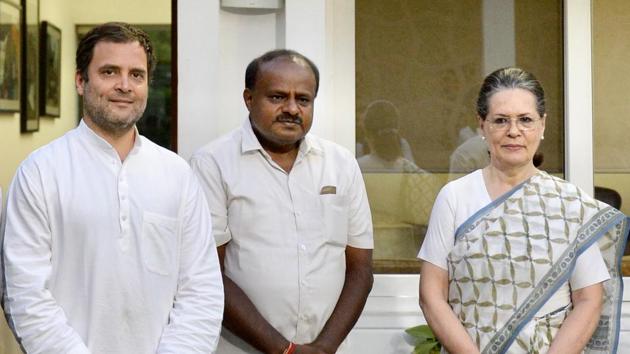The elimination of ego helped the Opposition in Karnataka
A BJP defeat in 2019 requires electoral coordination by non-BJP parties
As the anointments of office settle on HD Kumaraswamy, he knows that he has become more than the chief minister of Karnataka.

The timing of the Karnataka election has given him, adventitiously, this national dimension. Coming just after the one in Gujarat and just before the ones due in Madhya Pradesh, Rajasthan and Chhattisgarh, the Karnataka poll became a dress rehearsal for those and, more significantly, for the general election in 2019. The rehearsal that gave no clear verdict did hold one clear lesson to the Congress and the JD(S) in Karnataka: coordinate or perish. And one clear lesson to the Congress and all non-BJP parties in the country: unite or face another defeat in 2019.
The Congress’s reaching out to the son of the JD(S) chief H D Deve Gowda and forming a coalition had to be hailed by parties across the country, from the CPI-M to the Trinamool, the AAP to the Telugu Desam, the National Conference to the DMK. It was inevitable that Kumaraswamy should become a ‘Kashmir to Kanyakumari’ mascot. A BJP defeat in 2019 requires electoral coordination by non-BJP parties and, today, that coordination requires such a mascot.
A similar hailing had occurred last year around the son of another regional leader with a national profile — the DMK chief M Karunanidhi’s chosen heir, M K Stalin. Leaders of parties from across the country, including Nitish Kumar, who was later to move to the NDA, gathered on the Marina sands to celebrate father and son, very like they did last Wednesday at the Vidhan Soudha in Bengaluru. That coming together did not go in vain. Opposition unity at the time of the elections of the President and Vice President last year could not have changed the outcome of those. But it showed that the Opposition, if it wants to, knows how to hold together.
The recently-concluded Gujarat elections, and the by-elections in Uttar Pradesh showed that when opposition forces group, the notional 69% that did not vote for the BJP in 2014 becomes real. Jignesh Mevani’s election to the Gujarat Assembly from Vadgam, Gujarat, in December 2017 as an independent candidate backed by the Congress and AAP showed how the BJP could be routed by a consolidated opposition in its own fortress. He polled some 20,000 votes more than the BJP’s Harkhabhai. Jignesh’s charisma plus the Congress and AAP vote was unbeatable. Likewise, Pravin Kumar Nishad of the SP winning the Gorakhpur Lok Sabha by-election in March this year over the BJP’s Upendra Dutt Shukla was quite simply because the BSP had backed him. The SP-BSP combine was invincible. Nishad polled 4,56,513 against Shukla’s 4,35,632. The Congress’s Surheeta Kareem polled 18,858. If the Congress too had supported him, Nishad would have won more comfortably. There are other examples as well, but Vadgam and Gorakhpur stand out.
Before the Karnataka election, the Congress and JD(S) missed the message of Vadgam and Gorakhpur. Post-poll, they have grasped it adroitly. But in what has transpired in Karnataka, there is something beyond intelligence, beyond adroitness. And that is the subordination of egos. The Congress has not been celebrated for egolessness. The JD(S) has not been known to acknowledge another’s political superiority in Karnataka. Their respective results pared down their respective egos. And this is where two national personalities come in — Sonia Gandhi and HD Deve Gowda. The former Congress President who could have become Prime Minister of India on at least two occasions, and the former Prime Minister of India have a sense of India beyond state assemblies. They also have an idea of the arithmetic of elections in India. They know where the future of India lies with a supremacist party in power at the Centre and in several states. There can be no doubt that their advice to their sons and legatees would have been: ‘We should have done it pre-poll but let us at least get together now, not just for Karnataka but that of the 2019 elections.’ And the sons, with wisdom and intelligence and the courage of ego-elimination, listened.
The pursuit of political power, of electoral success, does not lend itself to the elimination of ego. Rather, it feeds and feeds on the ego. Rahul Gandhi’s example in Karnataka is, therefore, atypical in politics. It is certainly different. The coming electoral tests require just that touch of difference. If he shows the same egolessness, logolessness, selflessness, then the 2018 mascot in Bengaluru could well impact on the 2019 mandate in India.
Gopalkrishna Gandhi is distinguished professor of history and politics, Ashoka University
The views expressed are personal






